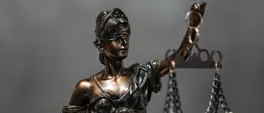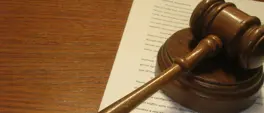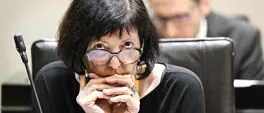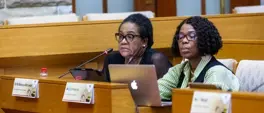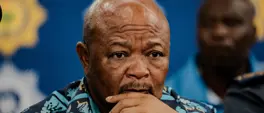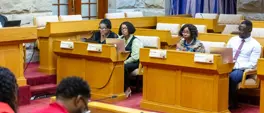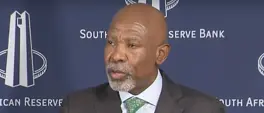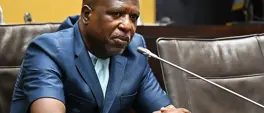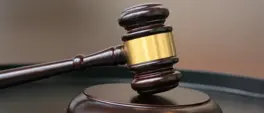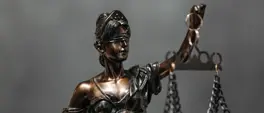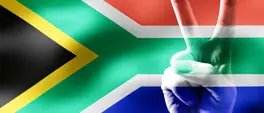CHARLES MATSEKE | How the Katiso Molefe case exposes South Africa’s descent into elite impunity
Charles Matseke
23 October 2025 | 8:50"This institutional cowardice allows syndicates to thrive. Each time the NPA flinches, another whistle-blower dies and another syndicate operative secures release. The result is selective justice: relentless against the weak, indulgent toward the powerful."

Murder-accused Katiso 'KT' Molefe appeared in the Alexandra Magistrate's Court on 20 August 2025. Picture: Sphamandla Dlamini/EWN
When Katiso “KT” Molefe was granted bail, the judgment did more than free an accused underworld figure, it exposed a country where the law bends instinctively toward power. On Tuesday afternoon, before the Madlanga Commission in Johannesburg, a Gauteng detective dropped a revelation that should shake the Republic’s conscience: Katiso “KT” Molefe allegedly paid R2.5 million to secure his bail.
The allegation emerging scarcely a week after his controversial release is not just another footnote in a corruption case. It is the smoking gun of a justice system that has transitioned from moral fatigue into outright commodification. Bail, once a legal instrument of fairness, has become a purchasable privilege for the politically connected.
When Molefe walked out of custody, the court described his release as consistent with the presumption of innocence guaranteed under Section 35 of the Constitution. Yet what the Commission heard this week confirms what the public already suspected: that the decision owed less to principle than to price.
According to Witness A, a detective-investigator from the Gauteng Organised Crime Unit, intermediaries acting on Molefe’s behalf delivered the R2.5 million to ensure a “smooth bail process.”
The same witness linked Molefe to the murder of whistle-blower Armand Swart of Transnet Freight Rail, and detailed how ballistic evidence was tampered with, lab results moved to KwaZulu-Natal, and senior police officers warned him that “you are dealing with dangerous people.”
Section 60 of the Criminal Procedure Act requires courts to deny bail where the interests of justice so demand: when the accused poses a danger to witnesses, public safety, or the credibility of the legal system. On every one of these counts, Molefe’s profile screams detention.
Instead, the court chose to prioritise the presumption of innocence. In doing so, it followed a formalist logic divorced from South Africa’s lived reality of elite criminality. The Molefe judgment exposes a deeper philosophical crisis: our courts have confused neutrality with justice.
In S v Dlamini (1999 (2) SACR 51 (CC), the Constitutional Court warned that bail “is not a mechanical right” and must balance the liberty of the accused against the safety of the public. In S v Mathebula (2010 (1) SACR 55 (SCA), the Supreme Court held that “bail should never facilitate the defeat of justice.”
Yet in 2025, that dictum lies in ruins. The judiciary leans reflexively toward elite defendants while the poor remain remanded for minor offences.
Under apartheid, the law served race. In democratic South Africa, it increasingly serves class. The presumption of innocence has become the luxury good of oligarchs, affordable only to those who can pay for it.
The claim of a R2.5 million bribe does not merely implicate corrupt officers; it indicts a system in which justice itself is priced. The interest of justice test meant to protect the public has been hollowed out by the monetisation of legal discretion. Judges, prosecutors, and advocates move within overlapping networks of influence and empathy. They are, as former SAPS Commissioner Nhlanhla Mkhwanazi warned, “captured not by bribes alone, but by belonging.”
The National Prosecuting Authority once again stood paralysed. Despite evidence of interference, the NPA mounted only a procedural opposition to Molefe’s bail. It failed to highlight the danger to witnesses, the ongoing tampering of evidence, or the implications for national confidence in the judiciary. In doing so, it re-enacted the tragic choreography of South African law: perform accountability, then retreat.
This institutional cowardice allows syndicates to thrive. Each time the NPA flinches, another whistle-blower dies and another syndicate operative secures release. The result is selective justice: relentless against the weak, indulgent toward the powerful.
In game-theory terms, South Africa’s justice system is trapped in a non-cooperative equilibrium. Every actor from the bench to the NPA to the police acts rationally for self-preservation, not collective reform. The Madlanga Commission and the Parliamentary Ad Hoc Committee reflect this pathology: hearings without consequence, evidence without enforcement.
The Molefe episode proves that the interest of justice principle has been replaced by the interest of elites. A survival pact in which no institution exposes another for fear of Mutually Assured Destruction.
Other democracies facing organised-crime infiltration have adapted. Italy’s anti-mafia code allows preventive detention for suspects whose release threatens the integrity of investigations. Brazil’s Supreme Court invoked the “collective harm” doctrine to deny bail in systemic corruption cases. Both recognise that ordinary rules collapse under extraordinary criminality.
South Africa’s judiciary, by contrast, clings to textbook liberalism, applying 1990s jurisprudence to a 2025 underworld. It insists on innocence while the Republic bleeds and democracy crumbles.
The human cost is unbearable. Witness A now lives in constant relocation; Witness B speaks of fear and surveillance. The murder of Armand Swart, like that of Babita Deokaran before him, illustrates a state where truth-telling has become a death sentence. When suspects with such records obtain bail and allegedly purchase it the message to future whistle-blowers is devastatingly clear: silence is safer than justice.
The Molefe case confirms that South Africa’s justice system has mutated from rule of law to rule by loophole. The presumption of innocence has become a smokescreen for organised impunity, and the interest of justice a forgotten clause recited without conviction.
Our judiciary now resembles the elites it is meant to restrain. Each bribe, each lenient ruling, each bureaucratic delay tightens the oligarchic grip on the Republic. The state that once prosecuted injustice now administers it with civility.
South Africa’s courts face a defining choice. They can continue to interpret the law as a sterile ritual, detached from social consequence, or they can reclaim the moral courage envisioned in the Constitution’s preamble “to heal the divisions of the past and establish a society based on democratic values, social justice and fundamental human rights.”
The R2.5 million bribe claim is more than evidence of criminality; it is a mirror reflecting the judiciary’s own decay. If judges, prosecutors, and investigators do not re-centre the interest of justice, then the presumption of innocence will remain a private privilege for those who can afford it.
The Molefe saga fuses every symptom of our institutional sickness captured policing, a timid NPA, purchasable justice, and the silencing of truth. It demonstrates how far the Republic has drifted from constitutional morality toward transactional governance.
Justice, once blind, now counts in millions. The courts, once temples of fairness, have become auction rooms where freedom is the highest bid. Unless the judiciary reclaims its integrity unless it dares to choose justice over comfort, protection over privilege South Africa will complete its descent into what it already resembles: a democracy run by its defendants.
Charles Matseke (MPhil in Politics and International Relations) is a researcher and writer with a keen interest in contemporary political dynamics. His research focuses on electoral politics, foreign policy analysis, and international relations, with a particular emphasis on the Global South and Africa's role in global affairs.
Get the whole picture 💡
Take a look at the topic timeline for all related articles.
